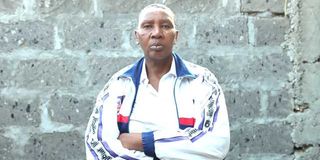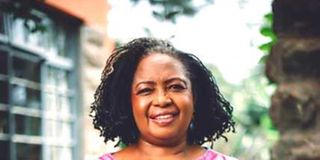Behind closed doors : The struggles of caring for dementia patients

Rosemary Kamau with her mother, Salome, during the interview at her home in Matopeni, Kayole, Nairobi County. Photo/ PAULINE ONGAJI
What you need to know:
- The country’s aging population is expected to double over the next three decades, and by 2050, the number of people living with dementia is projected to reach 361,000.
- Rosemary Kamau, a mother of six, runs a daycare centre in Kayole, in Nairobi's Eastlands. She lives with her 90-year-old mother, Salome Wacera, in Matopeni, Spring Valley Ward.
- Immaculate, who once worked as a casual labourer in Eastleigh, left her job after the Covid-19 pandemic to return home in Kyeleni village, Machakos County, and care for her aging parents. Her father, 97, and her mother, 86, both suffer from dementia
- Monica Kinyanjui, an anthropologist and businesswoman in Nairobi, is using her voice to raise awareness about the difficulties faced by caregivers
Across Nairobi, two women in different corners of the city carry the weight of caregiving for their aging parents. While they share the same goal of ensuring their loved ones' dignity and comfort as they battle dementia, their circumstances couldn't be more different.
In affluent areas, the financial and emotional strain of caregiving often blends into the fabric of well-resourced households. In poorer neighbourhoods, caregiving becomes an exhausting, all-consuming responsibility, marked by financial desperation and a constant fight for access to basic necessities.

Rosemary Kamau during the interview at her home in Matopeni, Kayole, Nairobi County. Photo| PAULINE ONGAJI
Rosemary Kamau, is a 60-year-old mother of six, runs a daycare centre in Kayole, in Nairobi's Eastlands. She lives with her 90-year-old mother, Salome Wacera, in Matopeni, Spring Valley Ward.
Salome, once a fiercely independent woman who raised her children single-handedly, has been battling the ravages of dementia for the past three years.
Rosemary's mother's decline was gradual, marked by strange lapses in memory, forgetfulness, and difficulty in performing basic tasks like cooking, cleaning, and eating.
But the real change came after Rosemary's sister, a twin, passed away four years ago. “After my sister died, I noticed a change in my mother. She didn’t want to eat or bathe. She started talking to herself, and sometimes, she’d forget that she had eaten just an hour before,” she says.
At first, Rosemary and her siblings took turns caring for their mother, but as her condition worsened, Rosemary became her primary caregiver.
“I decided to take care of her myself, though I knew it would be hard. It's been three years now, and the challenges keep growing,” she says.
The burden of caregiving is immense. Rosemary spends much of her day managing her mother’s needs—cleaning her, making sure she eats, and attending to her frequent calls for attention.
The financial strain adds another layer of difficulty. Rosemary’s mother requires special food and diapers, which are a significant expense, especially considering that Rosemary's daycare business often doesn't generate enough income to cover these costs.
“When I don’t have money, I have to depend on my husband to help. Sometimes, I have to ask for a free car ride to take my mother to the hospital, or to buy groceries. It's not easy, but I don’t have another choice.”
Despite these hardships, Rosemary is not alone in her caregiving duties. Her six children, pitch in where they can.
“My children know their grandmother well and so at times they feed her,” she says. “I was lucky that my husband accepted this responsibility, though I know it's hard on him too.”
But the real challenge lies in finding affordable help. Rosemary has tried employing caregivers, but they often quit after a short period. “I’ve hired several people to help me with my mother, but they don’t stay long. It’s hard to find someone who understands the gravity of dementia care,” she says.
In a city where the cost of living continues to rise, caregiving is an even greater challenge for those in low-income areas like Kayole, where access to healthcare and specialised services is limited.
Rosemary's story is not an isolated one. Further north, in the densely populated area of Huruma, Immaculate Ngwili, 52, faces similar challenges in caring for her elderly parents.

Immaculate Ngwili, during the interview about taking care of her parents who have dementia. PHOTO| PAULINE ONGAJI
Immaculate, who once worked as a casual labourer in Eastleigh, left her job after the Covid-19 pandemic to return home in Kyeleni village, Machakos County, and care for her aging parents. Her father, 97, and her mother, 86, both suffer from dementia, a condition that has strained their already fragile finances.
“My father was always a strong man until he started showing signs of dementia,” Immaculate explains. “He would forget things like where he put his money, and sometimes, he would wander off. It got worse when he started leaving the house at night, saying he was going to the market.”
Her mother, who had always been independent, also began to show signs of dementia. “She would forget that she had eaten, or she would look for things that were right in front of her. It was heartbreaking to watch them both decline.”
Immaculate’s situation is made even more challenging by her financial difficulties. In order to support herself, she made the decision to return to the city, this time bringing her parents along.
She is currently unemployed, and her home was one of those demolished for being situated on riparian land in Huruma estate. For the time being, she shares the small house she has rented with her mother and children.
Currently, Immaculate's father has been admitted to a nursing home due to the severity of his condition, but the cost of the facility is overwhelming.
“I can’t take care of both of them at home, so my father is in a nursing home,” she says.
Immaculate's story is one of profound sacrifices, as she juggles caregiving duties with the responsibility of raising her children.
“As we speak, my child who is in form two was sent home from school because we couldn't afford the fees,” she says. “I have to figure out how to pay for diapers and food for my parents. I can't even think about my own needs. It's a constant struggle.”

Monica Kinyanjui, founder of Women for Dementia Africa, a support network dedicated to amplifying the voices of Dementia women caregivers. Photo| COURTESY
While Rosemary and Immaculate face these daunting challenges, others like Monica Kinyanjui, an anthropologist and businesswoman in Nairobi, are using their voices to raise awareness about the difficulties faced by caregivers.
More than 20 years ago, Monica’s family’s life took a turn when Alzheimer's disease entered their lives. Monica’s mother was diagnosed with the condition in 2003, around the age of 67, after showing early signs of forgetfulness—such as forgetting where she had parked her car.
A once avid gym-goer, she would also forget what clothes she had brought with her to the gym.
In 2003, after further decline, she was diagnosed with Alzheimer's, a form of dementia. The family was told there was no medication to cure it, and Monica's husband became her primary caregiver.
As the disease progressed, Monica's mother faced increasing challenges, such as forgetting to eat. By February 2007, she had to be hospitalised for four days after she became unable to feed herself.
When she returned home, she wasn’t the same. While she could eat again, her speech was severely affected, and by May, her condition worsened—she suffered a stroke and heart attack, and passed away just three months later.
However, the story didn’t end there. In 2015, Monica’s father in law began to show signs of dementia. Initially, the family laughed off his forgetfulness and strange behaviour—like his repeated requests to go to the bank or his former workplace.
But as his condition worsened, Monica realised that she and her husband needed to become his primary caregiver. Her father now requires complete palliative care, including assistance with eating and mobility, as he is wheelchair-bound.
“It’s hard watching someone who was once independent and active in business gradually lose their abilities,” Monica says. “The disease changes them entirely, and that takes a toll emotionally.”
The cost of hiring professional caregivers can be prohibitive. Monica’s family has employed both formal, registered caregivers and informal caregivers, but the cost of the former is particularly high, as they require care throughout the day and at night. To make the situation more manageable, Monica and her husband decided to build their home near her father’s which was an added financial burden.
Dr Juzar Hooker, a neurologist at the Aga Khan University Hospital in Nairobi explains that dementia is a progressive disease that gradually diminishes a person’s identity by impairing their memory, behaviour, and cognitive abilities. “As the disease progresses, individuals experience a loss of memory, cognitive function, and the ability to carry out daily tasks,” he explains.
Experts emphasise that dementia is not only devastating for those directly affected but also for the family members and loved ones who assume the role of caregivers.
Prof Catherine Gachutha, Chairperson of the Kenya Counselling and Psychological Association, notes that while the medical diagnosis of dementia is well understood, the psychological toll it takes on caregivers is often underestimated.
For many caregivers, she explains, the experience becomes a silent struggle—marked by physical and emotional exhaustion, frustration, and deep sorrow as they watch their loved one gradually fade away.
The anguish, she adds, is intensified by the fact that despite the individual being physically present, the person they once knew is slipping away mentally and emotionally, making the caregiving journey all the more heartbreaking.
“This is because they can no longer connect with them in the same way. A significant part of the person’s memory is gone. The individual may seem like a different person entirely,” Prof Gachutha explains.
“They often feel isolated, and as the demands of caregiving take precedence over other aspects of life; they may become overwhelmed by the responsibility,” adds Prof Gachutha.
According to Dr Hooker, this burden is not just emotional— it is also physical and financial. “Many caregivers, especially in low- and middle-income countries like Kenya, are left without formal support systems or training to handle the myriad demands of caregiving.”
“Caregivers need to understand the importance of having a self-care plan,” remarks Prof Gachutha. “This could include activities like journaling, joining a choir, or participating in other activities that help relieve the stress. Taking time for oneself is crucial to maintaining mental and emotional well-being.”
And so as the global population ages, the number of people living with dementia continues to rise. In Kenya, the situation is no different. The country’s aging population is expected to double over the next three decades, and by 2050, the number of people living with dementia is projected to reach 361,000.
However, dementia care in Kenya faces numerous challenges, particularly in rural areas, where access to healthcare resources and trained medical professionals is limited.
According to the World Health Organization (WHO), there is a severe shortage of neurology healthcare workers across Africa, with Kenya being one of the affected countries. This shortage presents a significant barrier to providing adequate neurological care in sub-Saharan Africa.
Dr Hooker explains that due to the lack of trained neurology professionals, dementia care often falls to family members who are frequently unprepared for the physical, emotional, and financial demands that come with caregiving.
“In rural areas, the situation is even worse,” Dr Hooker says. “Caregivers often lack access to trained medical professionals, and formal support systems are almost non-existent.”
And what makes matters worse is the stigma surrounding the condition makes it difficult for caregivers to seek help.
“Cultural beliefs and practices further complicate matters. In many Kenyan communities, dementia is misunderstood and sometimes attributed to witchcraft or divine punishment. As a result, caregivers often feel isolated, ashamed, or reluctant to seek help, even when they are struggling,” adds Prof Gachutha.
She emphasises the importance of acknowledging the mental health challenges faced by caregivers. “Many caregivers in Kenya do not seek psychological support due to cultural expectations that caregiving is a family responsibility. This reluctance to seek help exacerbates the emotional and psychological toll on caregivers,” she adds.
Experts agree that addressing the growing burden of dementia care in Kenya requires a holistic approach. “This includes the development of dementia-specific care services, better training for healthcare workers, and increased public awareness to reduce stigma,” explains Dr Hooker.
It is through these efforts, Prof Gachutha adds, that the psychological and emotional burdens of caregivers can be alleviated.
But also, she insists the importance of the family seeking help at the early stages of diagnosis.
“When a family member is diagnosed with dementia, it is essential to seek professional help,” she advises. “This helps in developing a structured care plan, including taking regular breaks. Caregivers should alternate responsibilities, particularly in the later stages when the person needs more intensive care.”
But it is not just about the caregivers, says Prof Gachutha. “Raising awareness about dementia and breaking the cultural stigma surrounding it, will create a more supportive environment for both caregivers and patients. This will allow those affected by dementia to live with dignity and respect.
For Monica, this experience deeply affected and inspired her to dedicate her life to supporting people living with dementia. She began working with support groups for caregivers, meeting in people’s homes to share resources and experiences.
Monica also founded Women for Dementia Africa, a support network dedicated to amplifying the voices of women caregivers—who make up the majority of informal caregivers. Through the organisation, she advocates for more resources and attention to the needs of women caring for dementia patients, especially in informal settings.
“Dementia is an incredibly expensive disease,” Monica reflects. “The people we care for often can’t earn a living, but the costs—like diapers, medical supplies, and caregiving services—are constant.” This reality has driven her to continue raising awareness about the burdens caregivers face and to call for greater support for those who provide care.
pongaji@ke.nationmedia.com


